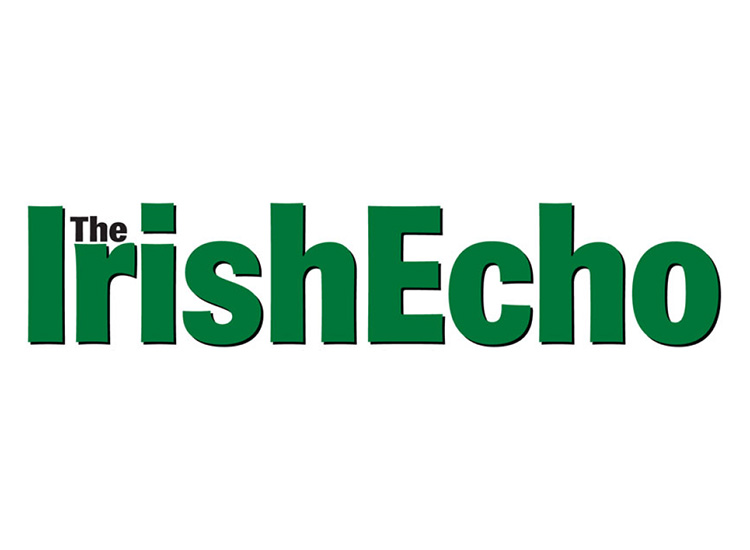Chas Moore, left, and Sean Lee of the Irish Cultural Center in Phoenix, Ariz. PHOTO BY PETER MCDERMOTT
By Peter McDermott
When they came to New York recently, Sean Lee and Chas T. Moore paid visits to the Irish Arts Center, Glucksman Ireland House, NYU, and the American Irish Historical Society. Next time, they hope to take in some other institutions, like the New York Irish Center in Long Island City.
They were duly impressed, naturally, but the visits also threw into sharp relief just how much they’ve achieved with their own Irish Cultural Center in the heart of Phoenix, combining as it does in one complex many of the same roles and activities carried out at those New York venues and even some that aren’t.
“It’s a daunting task,” said Executive Director Moore, who was born into an Irish-American family in Chicago, “but [the center] is incredibly popular. We have so many people who come down to visit us every day.
“We have the social component, the performing arts component, a book discussion group,” he said. And that’s just the start of the list.

The dedication of the McClelland Library.
Lee, who was born in Kells, Co. Meath, in 1940 and educated there and in Dublin by the Christian Brothers, recalled the first defining moment back in the 1990s, when the city of Phoenix put up “huge bond drive for a cultural center.” Businessman Bill O’Brien of the Executive Referral Irish Network (ERIN, now renamed Irish Network Arizona) “herded us all into a hotel room and said ‘The door is locked and nobody gets out until you come up with matching funds to the city’s offer.’”
The Irish Cultural Center, a Japanese garden, a community arts center and a Jewish social center are among the institutions that availed of the offer.
The 2012 opening of the McClelland Library, named for Norman P. McClelland, a Northern Ireland native and chairman of Shamrock Foods, was the second defining moment in the history of the center. McClelland, who died last July after a brief illness, was in 2016 honored by President Michael D. Higgins with a Presidential Distinguished Service Award for the Irish Abroad.
The theme of the current Book Discussion Group is the North of Ireland with works by Brian Friel, Brian Moore, Stuart Neville, Mary Beckett, Deirdre Madden and David Park up for consideration. Meanwhile, the Irish Cultural Center’s Peace and Reconciliation Program was nominated in the inaugural Irish Central Creativity Awards recently.
The center also caters to younger people with programs like 1st Saturdays Family Story Hour and the Irish Family Film Series.
Genealogy is inevitably part of the Irish Cultural Center’s story, and on Saturday, April 14, it offers for the second time this year a workshop, hosted by volunteer staff genealogist Miles Davenport, on Griffith’s Valuation and other Irish land and property records.

The McClelland Library.
Moore, who has a professional background as both an arts administrator and an academic librarian, said that the McClelland Library has the biggest depository of materials on the Irish in the Southwest, and plans on specializing on the Irish west of the Mississippi.
The Irish experience in Arizona can be documented as far back to Spanish army officer Hugo O’Conor in the 1760s. The Red Captain, as he was called by the Apache for the color of his hair, is considered the founding father of Tucson.
A post-war boom, helped by the development of air-conditioning, made Phoenix a major city – it’s now the fifth most populous in the nation and the most populous state capital.
Fifty and more years ago, the most obvious Irish presence perhaps were the 56 priests born in Ireland; by the time Lee arrived in 1987, about 30 of them were still alive.

The Hunger Memorial at the Irish Cultural Center.
Lee was destined for Australia to work as a trainee teacher when an uncle who was visiting from America suggested he cross the Atlantic instead. By 1959, he was in the Marines and served for six years, including a period in the reserves. He resumed his education with an economics degree and also began a highly successful corporate career that involved several relocations, the last of them to Arizona.
Lee said that of the 400 members of the center only a small fraction are, like him, Irish-born, but Moore pointed out that overall 10 to 12 percent of the population of this major metropolitan area claims Irish or Scot-Irish heritage.
The Irish Cultural Center is located at 1106 North Central Ave., Phoenix, Ariz. 85004. For more information call 602-2580109, email info@azirish.org or visit azirish.org.









